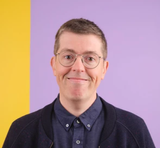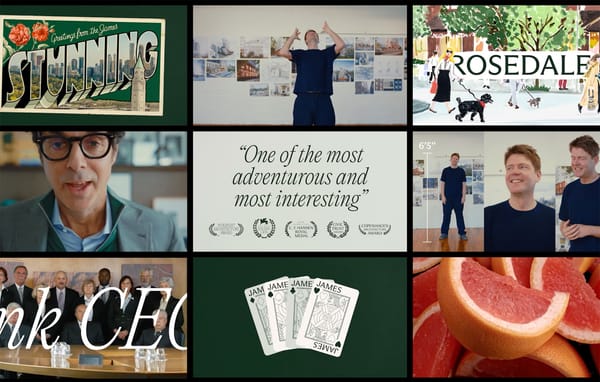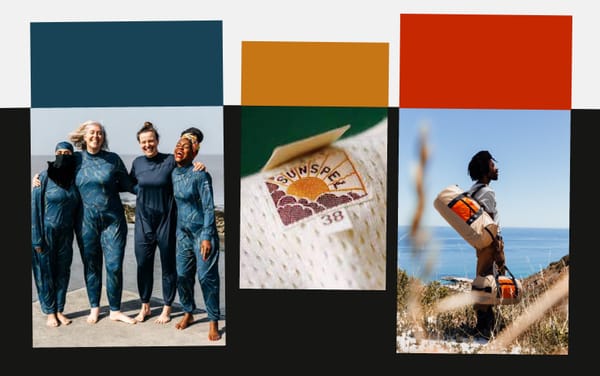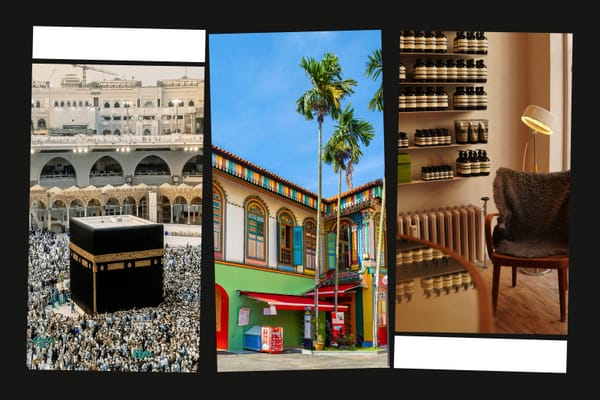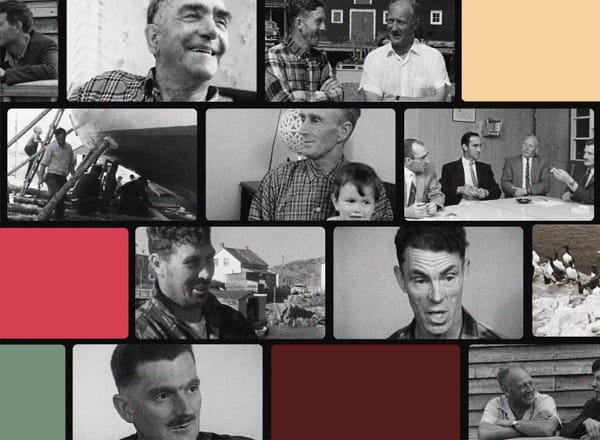Way Out There—and Everywhere
Educational experiments on two very different islands
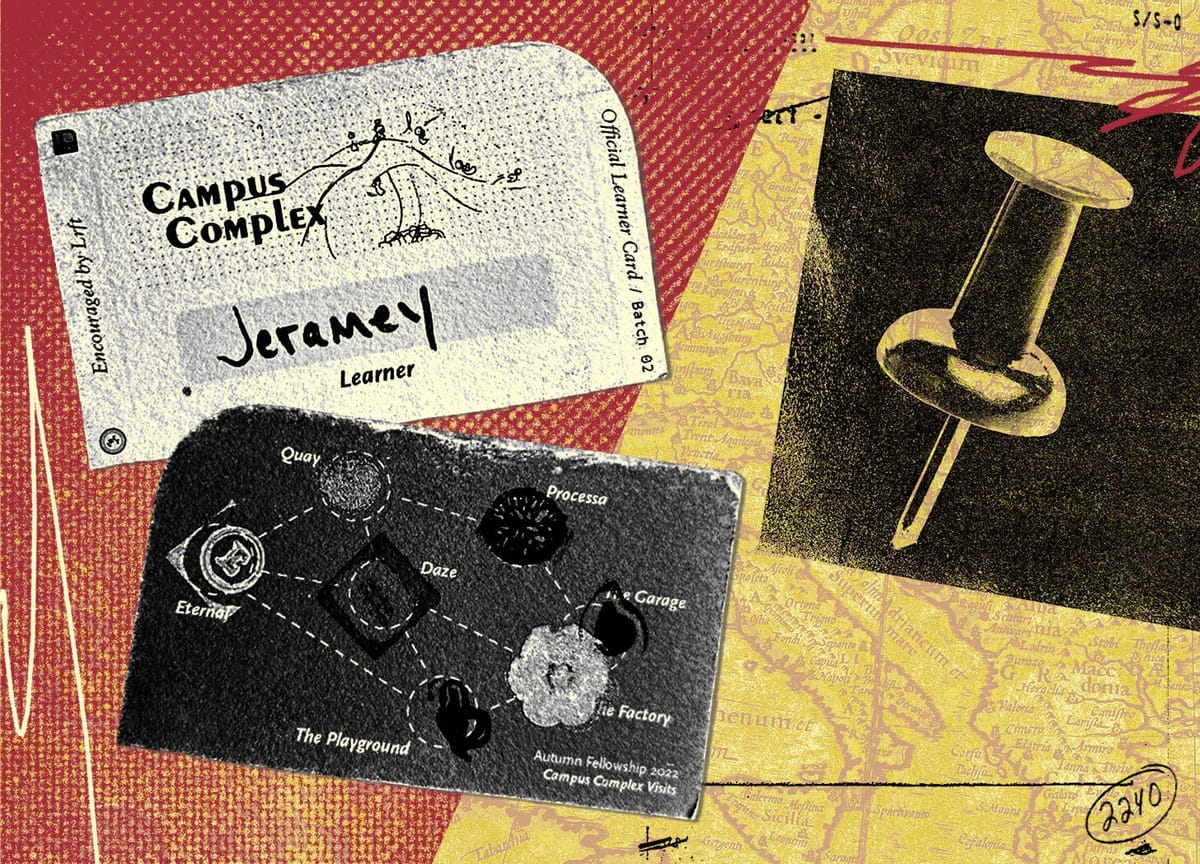
Hi everyone,
Next Wednesday, I’ll be joining editor Ashley Simone and architect and writer Wendy W. Fok on a panel about new approaches to publishing in architecture and design. The event is sponsored by DesignTO; you can find more information and register for the free livestream here.
A little more housekeeping: thanks to the forty or so people who joined us at Frontier’s studio last Saturday to celebrate Are.na and a more creative and collaborative internet. We created analog portraits in the form of small collages, which were compiled into a zine that everyone got to take home, and digital portraits (of our home screens and lock screens). Stay tuned for more chances to meet IRL.
Now, on to the URLs. This week’s issue is the first in a two-part “back-to-school special,” with a brief story pointing to two new, inspiring, and radically different educational experiments taking place on two very different island locales.
RIP Steve Roden (1964–2023).
Love all ways,
Brian
Way Out There—and Everywhere
My interest in alternative models of education arose early in life, not least because of my obvious unfitness for some of the learning environments I passed through. But it has been nurtured by two decades in the art world, where experiments in collaborative learning pop up everywhere, serving as economic necessity, forms of creative expression, and modes of sociability. To that end, I’m always seeking examples of self-organized and non-accredited educational initiatives. Two recent initiatives have caught my eye, both independently and for how their core ideas simultaneously align and diverge.
Last weekend, on Vis, a small Croatian island in the Adriatic Sea, Italian philosopher Franco Berardi helped inaugurate the Island School of Social Autonomy with a lecture titled “How Will We Live?” I’ve been following along as the school’s co-founders painstakingly renovate an old stone house in the hills above Komiža and reading with interest as they publish essays that cite many of the culture and education critics I most admire. I’m also intrigued because its list of cofounders includes not only philosophers, theorists, artists, and poets, but also actor-activists like Gael García Bernal and Pamela Anderson. That kind of support—both in visibility and funding—can give experiments like this one the momentum it needs to stay afloat.
The founders make the distinction between education and learning, noting, correctly, that learning mostly happens outside the formal institutions we have for education—and that the kinds of things taught in school may not serve us well for an “age of extinction.” So the ISSA should be “a place that imagines, experiments with, and cultivates forms of knowledge production and sharing that go beyond traditional notions of education and its purpose.” Its principles include “no curriculum,” “no quantification,” “play,” “hospitality,” and, “Pomalo!”
On Vis, that last term, they suggest, “is both a greeting meaning ‘take it slow’ and an island philosophy of how things can get properly done or how to react in utter crisis.” They’ve chosen to locate the project on the island in part for that attitude, how it refuses the orthodoxy “time is money,” and for the island’s antifascist and other histories. “Similar to ISSA itself, the island of Vis embodies an essential dialectic relationship between autonomy and dependency, nature and society, local and global. For ISSA, it is not an either-or situation.”
And what about that goal, social autonomy? “We perceive social autonomy as the ability of individuals to function as cooperative group members, engaging in communal self-governance while being aware of the interconnectedness and interdependence of communities within broader networks (or archipelagoes) of human and non-human life-organization.”
The metaphor of the archipelago and the idea of autonomy apply as well to Campus Complex, a fellowship program launched in late 2022 by Other Internet and Leave Room for Thoughts. The monthlong program “turned a disconnected group of private offices and studios [in New York City] into a traversable network of learning environments for three builders, artists, and researchers. Each fellow received a passport, called a Learner Card, to our constellation of spaces and educators. Their mission was to use the tools and affordances of the Campus to further their educational endeavors.”
In introducing the idea, Other Internet makes explicit reference to “the generative, permissive power of the ‘art residency.’ The residency is a social form—a pattern—that anyone can make use of.” And by locating that residency in a network of existing spaces, taking advantage of existing relationships, participants become “roving squads of peer apprentices.”
Importantly, as with ISSA, Campus Complex employs no explicit curriculum. “In well-equipped environments such as these, the architecture is a syllabus in itself. There’s no need to predefine a linear journey through a curriculum—the space invites you to explore your interests using any materials you find within an arm’s reach.”
If ISSA is for an “age of extinction,” Campus Complex is designed in part to counter the alienation of our increasingly digital interactions: the schoolscape is “a social form that encourages digitally-native citizens to engage meaningfully with the physical environment. It takes the network structure that is so familiar to citizens of the web and employs it in our physical environments.”
My relationship to ISSA will always be remote; I don’t expect to make the trip. It is a model of rigor and camaraderie, a beacon shining from the (quite literal) hills. For me, part of the beauty of Campus Complex is its portability: its creators want other people to take up and refine the model in their own cities. “We put the Autumn fellowship program together in about six weeks on a very small budget. If we can do it, you can too.” Its other appeal is in the fostering of what its founders term “Learner Eyes”: seeing the city around you as the site of endless educational opportunity, a night sky brimming with constellations of people using the resources they can access to help each other become who they want to be. ISSA’s motto applies to both initiatives: “We build the school, the school builds us.”
🔗 Good Links (audiovisual edition)
- 🎙️ Pilot and author Mark Vanhoenacker on his new book Imagine a City, on Monocle’s Meet the Writers podcast
- 🎙️ Metalabel founder Yancey Strickler on Joshua Citarella’s podcast discussing “digital-native institutions for the twenty-first century”
- 🎙️ Writer, filmmaker, and activist Astra Taylor on her new book The Age of Insecurity, on The Gray Area podcast (Taylor is midway through delivering this year’s CBC Massey Lectures)
- 📺 A thirty-minute talk by artist and technologist James Bridle “about personhood, non-indigenous species, colonial and imperial history, flooding, and our relation to the earth”

